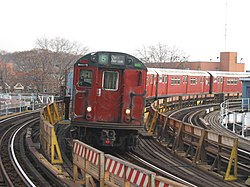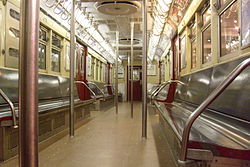R33 (New York City Subway car)
This article needs additional citations for verification. (December 2014) |
| R33 | |
|---|---|
 An R33 train on the 5 at West Farms Square–East Tremont Avenue | |
 Interior of an overhauled R33 car | |
| In service | 1962–2003 |
| Manufacturer | St. Louis Car Company |
| Built at | St. Louis, Missouri |
| Family name | Redbirds |
| Replaced |
|
| Constructed | 1962–1963 |
| Entered service | November 15, 1962 |
| Refurbished | 1987–1991 |
| Scrapped | 2001–2003 (revenue service cars) 2013 (cars used as refuse motors) |
| Number built | 500 cars (250 pairs) |
| Number in service | (42 in work service) |
| Number preserved | 11 |
| Number scrapped | 447 |
| Successor | R142 and R142A |
| Formation | Married Pairs |
| Fleet numbers | 8806–9305 |
| Operator(s) | New York City Subway |
| Specifications | |
| Car body construction | LAHT carbon steel |
| Car length | 51.04 feet (15.56 m) |
| Width | 8.75 feet (2,667 mm) |
| Height | 11.86 feet (3,615 mm) |
| Doors | 6 sets of 50 inch wide side doors per car |
| Maximum speed | 55 mph (89 km/h) |
| Weight | 72,900 lb (33,100 kg) (post-rebuild) |
| Traction system | GE 17KG192AE2/3 (9076–9305 formerly Westinghouse) |
| Traction motors | (?) |
| Power output | Westinghouse 1447JR/GE 1257E1, 100 hp (74.6 kW) per axle |
| Electric system(s) | 600 V DC Third rail |
| Current collection method | Contact shoe |
| Bogies | none |
| Braking system(s) | WABCO, "SMEE" electrodynamic |
| Safety system(s) | Emergency brakes |
| Track gauge | 4 ft 8+1⁄2 in (1,435 mm) standard gauge |
The R33 was a New York City Subway car model that was built by St. Louis Car Company in 1962 and 1963. The cars are a "follow-up" or supplemental stock for the A Division's R29s and closely resemble them. The cars were also referred to as R33MLs (R33 Main Line) to distinguish them from the R33S's. A total of 500 cars were built, numbered 8806–9305, and arranged in pairs.
The R33s entered service on November 15, 1962, and were the first A Division fleet to be retrofitted with air conditioning, being retrofitted between 1972 and 1982. The R33 fleet was overhauled between 1987 and 1991. The R33s were replaced in the early 2000s with the delivery of the R142 and R142A cars, with the last train running on April 20, 2003. After being retired, most R33s were sunk into the ocean as artificial reefs, but several cars have survived.
History[]
The first set of R33 cars was placed in service on the 1 train on November 15, 1962. Five hundred cars were built and served on all IRT subway lines.[1][2] In 1972, they became the first A Division cars to be retrofitted with air conditioning when cars 9086/7, 9118/9, 9162/3, 9226/7, 9282/3, & 9294/5 were retrofitted at the 239th Street Yard with a modified version of the Stone Safety Air conditioning unit designed to fit on the smaller IRT cars, and by 1982, all R33 cars had received air conditioning. The cars were also rebuilt between 1987 and 1991.
Before they were rebuilt, the R33 cars were grouped as follows:
- Cars #8806–9075 had General Electric electrical equipment
- Cars #9076–9305 had Westinghouse electrical equipment
From 1987 until early 1991, the R33 cars were overhauled and rebuilt by the MTA's 207th Street and Coney Island Overhaul Shops. All cars were refitted with General Electric equipment. Existing General Electric cars received New York Air Brake Newtran brake packages; the former Westinghouse cars received an updated brake package from the Westinghouse Air Brake Company.
After rebuilding, R33 cars served on the 2, 4, and 5 trains, and occasionally on the 7 train.
Retirement[]

In 1996, New York City Transit announced that it would begin phasing out all Redbirds with the arrival of the R142s and R142As, which entered service in 2000.[3] The last train of R33s consisting of pairs 8842–8843, 9090–9091, 9240–9241, 9294–9295, 9302–9303, made its last trip on the 4 route on April 20, 2003.[4]
Most of the retired cars were stripped and dumped into the Atlantic Ocean to form artificial reefs. 21 pairs were painted yellow and black and converted to work service as R161 rider cars RD400–RD441 from 1999 to 2007,[5][6] allowing the retirement of the older R71 rider cars. RD407 (ex-8869) was damaged in a derailment and was scrapped in 2013. RD440–RD441 were further converted into de-icer cars.
The R33 cars not converted into rider cars were saved for various purposes throughout the New York City Subway system. The full list includes:
- 8885 – converted into a rail adhesion car for the IRT Dyre Avenue Line after a derailment south of the Franklin Avenue station that led to the retirement of its mate, 8884.[7] The car is hauled by other cars during the fall season.
- 8912–8913 – used as a static display at the Tiffany Street Iron Shops, a training facility for elevated structure workers in Hunts Point, Bronx. This pair was previously involved in a derailment at the 239th Street Yard.
- 9010–9011, 9016–9017, 9068–9069 and 9206–9207 – preserved for the New York Transit Museum. They were repainted into various vintage paint schemes and used for various purposes since retirement, mainly on the Train of Many Colors.
- 9075 – on display outside Queens Borough Hall in Kew Gardens, Queens. The car was retrofitted with swinging doors and converted into a tourist center, but was closed in 2015 due to low patronage.[8] Since then, the car is now used as a landmark and for movie shoots.[9]
Other cars were retained for work service until 2013, when they were scrapped. The full list includes:
- Pairs 8812–8813, 8834–8835, 8996–8997, and 9000–9001 – used to haul refuse trains until being scrapped in 2013. It was based from the 38th Street Yard, and was replaced with R32s restricted to work service.
- Pair 8888–8889 – used to haul refuse trains until being scrapped in 2013. It was based from the Westchester Yard, but in 2011 was mothballed when Westchester Yard stopped using subway cars for work service.
- Pair 9156–9157 – used for police training at Floyd Bennett Field until late 2013, when the pair was replaced by R32 GE-rebuilt pair 3594–3595. The cars were moved to Linden Yard, and then up to the 207th Street Yard in 2014 for disposal.
References[]
- ^ "nycsubway.org: The IRT SMEE Fleet (R-12 – R-36)". www.nycsubway.org.
- ^ "nycsubway.org: A History of the IRT SMEE Cars, 1948–1964". www.nycsubway.org.
- ^ "NYC Transit prepared for major subway car procurement". Railway age. Simmons-Boardman Publishing Corporation. September 1, 1996. Retrieved November 27, 2009.
- ^ https://erausa.org/pdf/bulletin/2003/2003-06-bulletin.pdf
- ^ "Showing Image 81068". www.nycsubway.org. Retrieved October 22, 2020.
- ^ "Showing Image 81069". www.nycsubway.org. Retrieved October 22, 2020.
- ^ "nycsubway.org: Subway FAQ: Accidents". www.nycsubway.org.
- ^ Roberts, Georgett; Strum, Beckie (July 10, 2015). "Queens tourist center closes because no tourist ever went there". New York Post.
- ^ Ngu, Rebecca; Small, Eddie; Kern-Jedrychowska, Ewa (March 25, 2016). "'The Get Down' Filmed a Subway Scene in Queens' Retired Redbird". DNAinfo New York. Archived from the original on August 21, 2016. Retrieved July 1, 2016.
| Wikimedia Commons has media related to R33 (New York City Subway car). |
- Train-related introductions in 1962
- St. Louis multiple units
- New York City Subway rolling stock